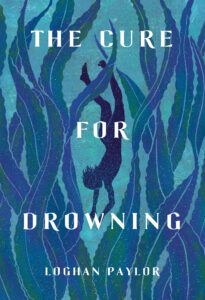A ‘soap opera in the best way possible’
The Cure for Drowning
by Loghan Paylor
Toronto: Random House Canada, 2024
$24.95 / 9781039006454
Reviewed by Jessica Poon
*

The Cure for Drowning, the debut novel from Abbotsford’s Loghan Paylor, is a love story with frequently lush nature descriptions and palpably poignant yearning that spans over two epic decades (1931-1953).
Like any romance worth its salt, the story’s founded on a love triangle: there’s Kit, born Kathleen, who wears boy’s clothes and tries to outrace trains on horseback; there’s Rebekah, a posh French-German girl from Montreal whose father is a doctor; and, there’s Landon, Kit’s older brother, who is brutish to Kit but genteel with Rebekah.
From the onset, it is evident that passionate intensity really only exists between Kit and Rebekah, a relationship immediately marked by physical attraction. Early on, Kit gives Rebekah a kitten, which is intended as a clandestine present but eventually discovered. It is arguable, perhaps, this kitten is not only a charming feline, but allegorical. In other words, Rebekah likes pussy.
Landon, meanwhile, is a bastion trifecta of convention, heterosexuality, and masculinity, by which I mean, his character irked me. On the other hand, he also represents the understandable allure of normalcy, respectability, and stability. There’s also a younger brother character named Jep, a sweet, easily distracted boy who has a way with animals.
The story begins in third-person omniscient and in epic fashion: “A ten-year-old girl walked into the forest with her two brothers and didn’t come out again.” What a hook. After Kathleen drowns, their mother, Caroline, refuses to accept it and resorts to Celtic magic that is unbeknownst to anyone else.
The scene reminded me of Willow Rosenberg killing a fawn in Buffy the Vampire Slayer during this disquietingly poetic description of a newborn lamb’s sacrificial death: “The scattering of blood across the snow was a constellation all its own.” I can’t help but feel the indomitable Caroline merits her own novel. After Caroline’s sacrificial ritual, Kathleen is reborn as Kit, an appellative rechristening from Jep accounting for Kit’s different personality.
The remainder of the story is told in alternating first-person point of views—Kit’s and Rebekah’s. While these first-person points of views are sufficiently engaging, they did not necessarily feel particularly differentiated in voice. I found the beginning pages’ third-person omniscient to be more authoritative and dramatic and would have liked to have read more of it.

There is no love story without considerable obstacles. After Rebekah’s father is almost attacked for being German, narrowly escaping due to Landon’s presence—okay, I guess Landon’s not completely reprehensible—Rebekah’s family returns to Montreal. It’s selfless, and also done without telling either Landon or Kit, who are by then hopelessly in love with Rebekah.
Landon joins the Navy, while Kit, after taking the clothes, identification, and papers of a guileless young boy on a train, becomes part of the Royal Air Force. The RAF scenes, despite having bombs, were dull compared to scenes with Kit and Rebekah, or even Rebekah and Landon—for, the heart of this novel is neither bombs nor Celtic mythology; it’s the relationships between its main characters. And when these relationships were not on the page, I became as impatient as a non-precocious child failing the marshmallow test.
All three characters end up cavorting amorously with other people, who are, comparably, unremarkable nonentities. These paramours are just ways to pass the time until we return to the triangle, which, of course, was never equilateral.
When Kit, Rebekah, and Landon are all finally in the same room, the tension is deliciously gravid. When Rebekah finds herself out of work and seeks refuge, her parents are reduced to being coldly distant, both geographically and in demeanour. Kit and Landon’s parents are magnanimous. The reunion between the three characters demonstrates their ill-ease with each other and they behave, to varying extents, with avoidance, flippancy, and rudeness.
There is death; there is romance. It’s a soap opera in the best way possible. I will not spoil the ending, but I will say, it is earned.
*

Originally from East Vancouver, Jessica Poon is a writer, former line cook, and pianist of dubious merit who recently returned to BC after completing a MFA in Creative Writing at the University of Guelph. [Editor’s note: Jessica Poon has reviewed books by Lisa Moore (ed.), Sandra Kelly, Robyn Harding, Ian and Will Ferguson, Christine Lai, Logan Macnair, Jen Sookfong Lee, J.M. Miro (Steven Price), Bri Beaudoin, Tetsuro Shigematsu, Katie Welch, Megan Gail Coles, and Ayesha Chaudhry for BCR]
*
The British Columbia Review
Interim Editors, 2023-25: Trevor Marc Hughes (nonfiction), Brett Josef Grubisic (fiction)
Publisher: Richard Mackie
Formerly The Ormsby Review, The British Columbia Review is an on-line book review and journal service for BC writers and readers. The Advisory Board now consists of Jean Barman, Wade Davis, Robin Fisher, Barry Gough, Hugh Johnston, Kathy Mezei, Patricia Roy, Maria Tippett, and Graeme Wynn. Provincial Government Patron (since September 2018): Creative BC. Honorary Patron: Yosef Wosk. Scholarly Patron: SFU Graduate Liberal Studies. The British Columbia Review was founded in 2016 by Richard Mackie and Alan Twigg.
“Only connect.” – E.M. Forster
5 comments on “A ‘soap opera in the best way possible’”